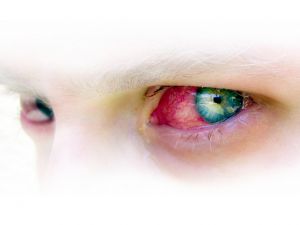What Is Allergic Conjunctivitis?
Whenever your eye gets red, looks swollen and has a discharge, you might automatically assume that you have regular conjunctivitis, which is also commonly called pink eye. However, there are differences between pink eye and allergic conjunctivitis.
With pink eye, there’s a bacteria present that’s causing the symptoms and pink eye is highly contagious. With allergic conjunctivitis, there’s no worry about it being contagious.
In this type of eye problem, an allergen has caused the eye to become inflamed. These allergies are the same ones that cause you to develop other allergic symptoms. Some of the most common causes for developing allergic conjunctivitis are the pollen from trees and grasses and outside environmental pollutants.
Indoor dust can cause allergic conjunctivitis - as can mold. Pet dander can cause an allergic reaction, too. When you drive in your car, if you drive with the windows down or the vent open, outside air is being pulled into the car - and this can also trigger a reaction.
During times when the pollen is heavy, you'll want to make sure the vents in your car recirculate the air, rather than pulling it in - and you’ll want to leave the windows closed. When you go outside during hot temperatures, protect your eyes from blowing dust and pollen by wearing eyeglasses or sunglasses.
The symptoms of allergic conjunctivitis are similar to pink eye, but there are some differences. You may notice that your eyes are red and swollen. Even the outside of the eyelid will look swollen.
You’ll feel a burning sensation in the affected eye - or in both eyes. When you look at your reflection, you might notice a discharge. The difference in the discharge with allergic conjunctivitis is that unlike pink eye, this discharge won’t be as thick.
Another symptom that you’ll notice is that you’re having excessive eye watering. Itching may also be present and is often one of the first signs of this allergic condition. You might also notice a difference in your vision.
If you’re experiencing allergic conjunctivitis, there are some steps you can take at home in order to get rid of your symptoms. Getting some over the counter eye drops can help lubricate your eyes.
Resting with a cool compress applied directly to your eyelids can also help take down the swelling. Taking an oral antihistamine can block the histamine response that’s causing the symptoms.
If these measures fail to give you any relief, you can see your doctor because you may need him or her to prescribe a steroid eye drop to reduce the swelling and inflammation.
Learn more about this subject here at your health online page that fully details the causes, symptoms, treatments and self help home remedy options for: Allergies![]() BACK TO “Your Health Online”
BACK TO “Your Health Online”
the A to Z directory of dealing with Health Problems & Self Care Strategies for natural remedies to your health issues.
==========
Further reading through our articles on health issues will give you a body of information that will help you decide what options you have to deal with the underlying causes of your problem through giving your body the nutrition products that will assist you body to heal from the inside out.

Subscribe to “Your Health Success” newsletter
Terms of Use | Privacy Policy |Disclaimer | Free Health Book
the A to Z directory of dealing with Health Problems & Self Care Strategies for natural remedies to your health issues.

Subscribe to get your weekly "Health Success Magazine" with a new complete & comprehensive Health Report in every edition!

to “Your Health Success”
our weekly F’R’E’E’ Newsletter
If you would like a free no-obligation private consultation or to contact Warren Tattersall for more information, please click here >> Contact Us

Click the books above to learn more about how we treat CFS naturally, to get your life back!
You will find many assorted Health Reports available for download free to you on this website!
Our free Health Success Reports are each available for you to download when you subscribe to receive them and their 7 part eCourse.
You can unsubscribe at any time, but we are sure you will want to receive all the email lessons of these informative ecourses.
Read more HERE to select the REPORT subjects of most interest (or concern) to you.









